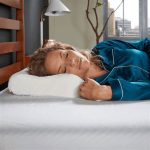Magnesium has become quite the buzzword in the sleep supplement space, with the interest in it seemingly rivaling melatonin.
As a certified sleep science coach, I am skeptical about the endless supplement options that promise better sleep and health. However, one brand, LifeForce, caught my eye with their two products designed specifically for sleep health: Magnesium paired with Peak Rest Lemon Tea. I caved to my intrigue and decided to test them out in tandem for a month.
Before we get into my experience, though, I want to emphasize that you should always talk to your healthcare provider before starting a new supplement. While I encourage you to talk to your own doctor, LifeForce has a team of healthcare providers you can work with via subscription if you have additional questions. With that, let’s investigate.
Sleep Advisor’s Testing Methodology
Sleep Advisor is very thorough in our testing processes across the board; supplements are no exception. Within these categories, we explore everything from manufacturing practices to customer experience –– namely, is it worth your hard-earned time and money to give this product a go?
It’s important to us that we understand the integrity of the ingredients used, how the product was made, and the brand’s overall transparency. This is your sleep health we’re talking about, after all.
To learn more, visit our full-length sleep supplements testing methodology page.
My Experience with LifeForce’s Peak Rest Tea and Magnesium
I wanted to get an idea of how these products performed together since they can be used in tandem and both rely on powerful ingredients to help the body get better rest. Over the course of a month, I would take the magnesium capsules and a serving of lemon tea one hour before bed. The packaging on the PeakRest Tea suggests using it one hour before going to bed, whereas the magnesium’s packaging just says “in the evening.” Regardless of your schedule, though, I would recommend giving yourself time to ingest this so it can really perform when it comes time for you to get some shut-eye.
The first week of using these two products in tandem, it was quite literally “lights out” — as soon as I shut my eyes, I felt like I was already approaching deep sleep territory. I didn’t note any dreams or lucid reactions in the same way I had experienced with taking melatonin; instead, this experience was dreamless and deep. When I woke up, I would refer to my fitness tracker to see what kind of sleep data it recorded overnight. Initially, it showed very restful sleep and a lot of time spent in the deepest part of sleep, which is scientifically referred to as Stage 3 NREM1, which stands for the third stage of non-rapid eye movement sleep.
As the month progressed, this night-after-night effect seemed to wane off. I was still achieving restful sleep, but not as deep as it was initially when these supplements were being introduced to my system. This could be for a couple of reasons: traveling, other medications I was taking, or even my body adapting over time to magnesium. LifeForce’s Magnesium and PeakRest Tea can be taken together or separately, so it may merit different results based on if I went with just using one over the other.
Now, two big callouts for product experience. It’s suggested you take 2 to 3 magnesium capsules per serving. I would usually take two since these capsules are bigger. I was able to get used to them over time, but they had a slightly chalky texture and may be difficult for those who prefer not to ingest large pills. The second callout is about the PeakRest Tea. You work your way up from a half scoop to a full one over the first two to three days of use, making sure your gastrointestinal tract can handle the surge in vitamins and minerals. I chose to add it to water, but you can also add it to herbal tea that’s caffeine-free.
Candidly, this “tea” didn’t taste well with just water, so I recommend trying a chamomile or fruit blend tea to mask the taste. You should also use a milk frother, electronic handheld mixer, or at the very least, a shaker bottle with this product. I made that mistake initially, and it was a clumpy mess, which made drinking the tea less enjoyable. I’m willing to look past all that for its overall performance with the magnesium tablets, as it really did assist me in getting to deep sleep faster.
Without a subscription, a monthly subscription to PeakRest tea is $105, and the magnesium capsules are $60.
Who LifeForce PeakRest Tea and Magnesium Might Be Best For:
Want to know if you might be a good fit for LifeForce PeakRest Tea and Magnesium? Read below to find out my thoughts on who may (and may not) like this combination.
Who Might Like PeakRest Tea and Magnesium:
- Consumers who’ll appreciate highly specialized care and regimen – If you opt to pay for the subscription, LifeForce gives you every resource they have to tailor a supplement program to your lifestyle. If better sleep is one of your top priorities, it’s folded into your plan.
- Middle-aged users – LifeForce is designed around those who are mid-life and want to make sure they maintain their health as they get older. These products are designed to ensure better sleep, and thus, overall health.
Who Might Not Like PeakRest Tea and Magnesium:
- Budget shoppers – This line and the brand overall may be out of reach for some users because even buying the supplements outside of a subscription can get expensive.
- Shoppers who need production transparency – There do not appear to be any certifications for the ingredients or production processes with LifeForce products.
What Is Magnesium and How Does It Work?
Magnesium isn’t just a mineral that can help promote better sleep –– it’s involved in over 300 enzyme processes2 across the body. You’ll find it working to reinforce brain health, your bones, blood, nerves, and muscles. When it comes to sleep, though, magnesium can help promote relaxation3 in order to help people fall asleep more easily.
What Is LifeForce Magnesium & PeakRest Tea Made Of?
Unlike melatonin, there are multiple kinds of magnesium, four of which are in LifeForce’s magnesium capsules: magnesium bisglycinate chelate, magnesium L-threonate, dimagnesium malate, and magnesium n-acetyl taurinate. Each of these types is included to serve very specific roles. Magnesium bisglycinate is present to lower stress levels, dimagnesium malate for the muscles, l-threonate for the brain, and acetyl-taurinate for the heart.
That’s just the capsules. To really go the extra mile to get you sleeping better, PeakRest Tea boasts a powerful ingredient list of botanicals and other minerals working with 120 milligrams of magnesium glycinate. It’s a mix of items such as rosemary and daylily extracts, creatine monohydrate, and ashwagandha to promote neurological health and lower stress levels. However, the studies the brand calls upon to back the inclusion of these ingredients were not performed specifically for the brand, and these blends hail from other brands and require their own research into each to see what they contribute.
About LifeForce
As I was researching this brand, there were a few distinctive factors that stood out to me. First, the brand offers a highly personalized subscription in which you send in a blood test to LifeForce’s in-house medical team. From there, your “LifeForce Diagnostic” sample is measured for over 40 mental and physical health biomarkers, including hormone analysis, and preserving them long-term. A supplement regimen is then created for you, with the medical team on hand to work with you virtually. These biomarker tests occur every three months, and your supplement regimen will change accordingly. The brand is catered to middle-aged customers, but it’s a fascinating model that health-minded adults of all generations could partake in.
While having a highly focused regimen with medical backing could be exactly what you need, it is a pricey subscription. Memberships can go for around $550, with a $129-month fee thereafter. However, those prices don’t include your supplements; while they’re discounted with a membership, supplements still cost extra. You have the option to cancel anytime, and you can just get the supplements by themselves, which is what I went with.
The biggest callout here, though, is the certifications. Certifications like this provide transparency into how the products are made and, in my eyes, are crucial for reinforcing a product’s quality and efficacy. After reaching out to LifeForce’s customer service, they assured me that the products were manufactured in facilities that are FDA, current Good Manufacturing Practice (cGMP), and National Sanitation Foundation (NSF) certified.
Overall, I thought this was a good experience, and I’ll continue to use this pairing of supplements for when I need the extra assistance in getting better sleep.
Sleep Advisor’s Performance Ratings for LifeForce Magnesium & PeakRest Tea
I was shocked at how quickly this product took to kick in, as the first week I was sleeping more soundly than I had in a while. However, as my body adapted to the new supplement routine, the efficacy dialed back a bit. In the future, I’d like to see how each product performs separately to determine if it warrants different results.
I was pleased to report that I did not experience any side effects while taking these supplements. That said if you opt to try these out, be aware of potential magnesium side effects4, such as diarrhea, nausea, and stomach cramps.
LifeForce pulls together a number of outsourced proprietary brands for their PeakRest Tea, with ingredients supposedly included to promote brain health and lower stress levels. However, none of the ingredients have any sort of certifications, and the studies used to back these claims are pretty broad and were not done specifically for this product. While certain elements like L-theanine for muscle recovery make perfect sense, I can’t necessarily say the same for the daylily extract courtesy of CLOCK®.
I’m a big fan of brands showing the traceability of ingredients and certifying the facilities where products are manufactured –– and LifeForce makes sure it has certifications on hand for the facilities that produce these supplements.
If you are not paying for a subscription, the price of these products may be too much –– especially considering there’s no insight into production or ingredient transparency. Even with the subscription, you only get a discount on supplements, and biomarker tests are encouraged every three months.
There are multiple ways to get in touch with customer service, whether that be calling in, emailing, or even texting. Responses are pretty swift, straightforward, and polite, with customers overall pretty happy with their quality of service.
LifeForce as a brand seems to be in pretty good standing with consumers, and the model of the company is bringing something new to the supplement industry. It’s important to remember that the medical staff you interact with are in-house, so they’re going to work in favor of the brand. That’s not necessarily a bad thing, but it’s not going to be the same impartiality as your regular healthcare provider.
Frequently Asked Questions
LifeForce is worth it if you consider yourself someone who wants to stay ahead of the curve when it comes to your long-term health. The products I tried worked well and may even be more powerful if they were used in tandem with a custom regiment. However, the price of the supplements alone may be too much for some who just want to try out magnesium supplements.
Generally, over-the-counter magnesium supplements are considered safe to take every day at a healthy dose. However, some doctors may recommend supplements as just a short-term solution rather than a long-term one.
The upside to magnesium is that you can often boost your intake through a healthy, balanced diet as well. Some examples of foods with magnesium include almonds, spinach, brown rice, and oatmeal.2
According to Harvard Health, people with kidney disease have an increased risk of toxicity from too much magnesium because their kidneys can’t flush out the extra magnesium properly.2 However, if you have any health conditions or are taking other medications, it’s especially important to consult your doctor before taking magnesium (or any supplement). In general, though, we encourage anyone to consult their healthcare provider before taking supplements.
My Final Thoughts on LifeForce Magnesium & Peak Rest
I’ve never been much of a magnesium user, but after trying out LifeForce, I’m a fan. However, there’s much room for these products to improve, especially with production transparency and price point. Improving on these aspects would make me feel better about my investment instead of raising more questions about it.
I plan on continuing to use these products for nights when my circadian rhythm needs a boost, and I look forward to seeing what the company comes up with next for sleep health products. Overall, this product earned a 3.8 out of 5.
Julia Forbes
Lead Product Tester
About Author
Julia is the Lead Reviewer at Sleep Advisor, specializing in testing out mattresses and sleep accessories – she’s in the right line of work, because she loves to sleep.
Education & Credentials
- Certified Sleep Science Coach
References:




Leave a Reply